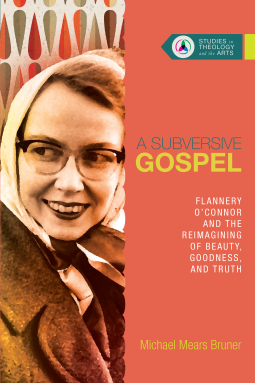
A Subversive Gospel
Flannery O'Connor and the Reimagining of Beauty, Goodness, and Truth
by Michael Bruner
This title was previously available on NetGalley and is now archived.
Send NetGalley books directly to your Kindle or Kindle app
1
To read on a Kindle or Kindle app, please add kindle@netgalley.com as an approved email address to receive files in your Amazon account. Click here for step-by-step instructions.
2
Also find your Kindle email address within your Amazon account, and enter it here.
Pub Date Oct 28 2017 | Archive Date Dec 13 2017
InterVarsity Press | IVP Academic
Description
The good news of Jesus Christ is a subversive gospel, and following Jesus is a subversive act. These notions were embodied in the literary work of American author Flannery O'Connor, whose writing was deeply informed by both her Southern context and her Christian faith.
In this volume in IVP Academic's Studies in Theology and the Arts series, theologian Michael Bruner explores O'Connor's theological aesthetic and argues that she reveals what discipleship to Christ entails by subverting the traditional understandings of beauty, truth, and goodness through her fiction.
Bruner's study serves as a guide for those who enjoy reading O'Connor and—even more so—those who, like O'Connor herself, follow the subversive path of the crucified and risen one.
Advance Praise
"Michael Bruner's new book on Flannery O'Connor is as radical as its title suggests, showing that O'Connor is one of the most accomplished modern writers of Catholic theological aesthetics. Tracing this accomplishment not only to the familiar foundations of Thomism, Bruner breaks new ground in O'Connor studies by discussing in detail the influence of Friedrich von Hügel upon her work, showing how this early twentieth-century Austrian Catholic helped O'Connor understand the importance of the theological transcendentals in great art. Seeing O'Connor's work as an expression of the many subversive elements of the Christian gospel, Bruner's critical approach helps us understand how O'Connor asks us to reimagine what beauty, goodness, and truth might mean in the modern world."
—Gregory Maillet, professor of English, Crandall University
Available Editions
| EDITION | Paperback |
| ISBN | 9780830850662 |
| PRICE | $30.00 (USD) |
| PAGES | 260 |
Average rating from 4 members
Featured Reviews
 Adam S, Reviewer
Adam S, Reviewer
Summary: An exploration of Flannery O’Connor’s writing, theology and influences.
A Subversive Gospel is the type of book that will never find a large audience, but that I thank God (literally) that Christian academic publishers still publish.
This is my year of exploration of Flannery O’Connor, which I am probably doing it all wrong. I have only read her short story collection A Good Man is Hard to Find and her Prayer Journal before deciding to read all of her fiction this year. I picked up a quick biography at the end of last year to give me a bit of context before I started. And then I was recommended A Subversive Gospel. A Subversive Gospel is oriented toward someone that is quite familiar with her work, especially The Violent Bear it Away, which is the most discussed work in A Subversive Gospel.
I did stop about 2/3 of the way through the book and quickly listen to the audiobook of Wise Blood to get a sense of O’Connor’s novel style. I will probably read A Subversive Gospel again, or at least parts of it, after I finish reading O’Connor's fiction. Most of the book, while referencing her writing, I think was good preparation for reading her books. I am glad I read it when I did, so that I will hopefully get more out of, and enjoy the books more, because I understand them more.
There were five chapters in A Subversive Gospel. The first is about O’Connor’s theological influences, primarily Baron von Hugel. The second was about O’Connor’s moral vision and how she understood the world around her theologically. The third was about her dramatic vision for her writing and is a lot about the style and choices that she made writing. The final two chapters are about several short stories and then the Violent Bear it Away as examples of how the previous three chapters work out in her writing.
This type of book is really an example of why I often wish I had been a literature major instead of a sociology major in college. I learned a lot from my sociology, but learning about how to be a better reader is one of my goals as a reader, and this is a book that really does help me become a better reader, not only of O’Connor, but more broadly as well.




